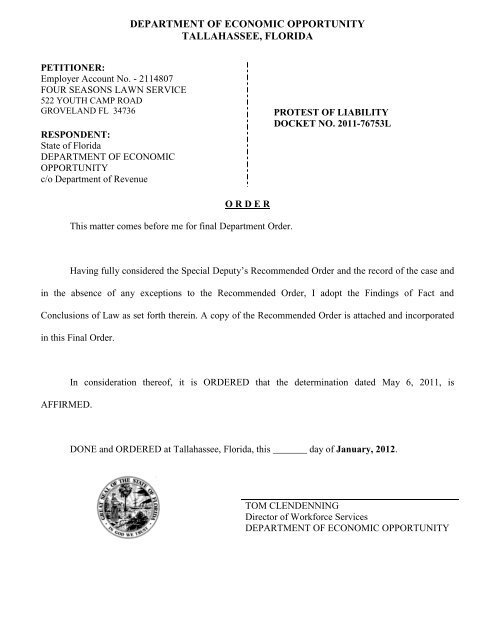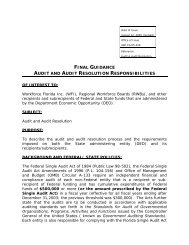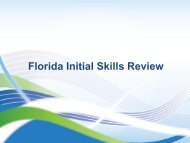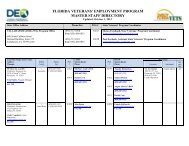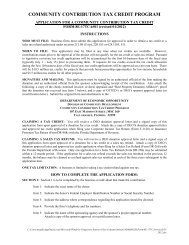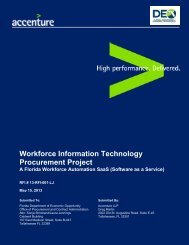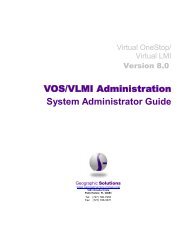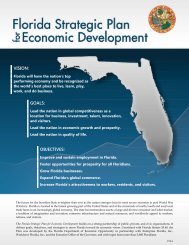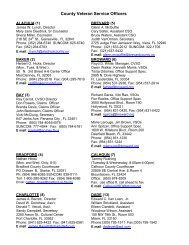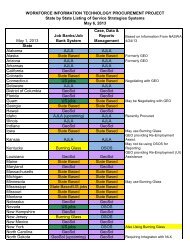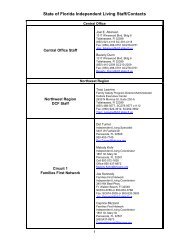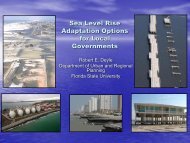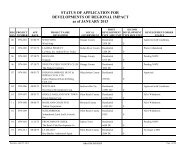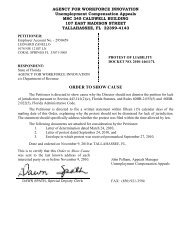NOTICE OF DOCKETING - Department of Economic Opportunity
NOTICE OF DOCKETING - Department of Economic Opportunity
NOTICE OF DOCKETING - Department of Economic Opportunity
You also want an ePaper? Increase the reach of your titles
YUMPU automatically turns print PDFs into web optimized ePapers that Google loves.
DEPARTMENT <strong>OF</strong> ECONOMIC OPPORTUNITY<br />
TALLAHASSEE, FLORIDA<br />
PETITIONER:<br />
Employer Account No. - 2114807<br />
FOUR SEASONS LAWN SERVICE<br />
522 YOUTH CAMP ROAD<br />
GROVELAND FL 34736<br />
RESPONDENT:<br />
State <strong>of</strong> Florida<br />
DEPARTMENT <strong>OF</strong> ECONOMIC<br />
OPPORTUNITY<br />
c/o <strong>Department</strong> <strong>of</strong> Revenue<br />
PROTEST <strong>OF</strong> LIABILITY<br />
DOCKET NO. 2011-76753L<br />
O R D E R<br />
This matter comes before me for final <strong>Department</strong> Order.<br />
Having fully considered the Special Deputy’s Recommended Order and the record <strong>of</strong> the case and<br />
in the absence <strong>of</strong> any exceptions to the Recommended Order, I adopt the Findings <strong>of</strong> Fact and<br />
Conclusions <strong>of</strong> Law as set forth therein. A copy <strong>of</strong> the Recommended Order is attached and incorporated<br />
in this Final Order.<br />
AFFIRMED.<br />
In consideration there<strong>of</strong>, it is ORDERED that the determination dated May 6, 2011, is<br />
DONE and ORDERED at Tallahassee, Florida, this _______ day <strong>of</strong> January, 2012.<br />
TOM CLENDENNING<br />
Director <strong>of</strong> Workforce Services<br />
DEPARTMENT <strong>OF</strong> ECONOMIC OPPORTUNITY
Docket No. 2011-76753L 2 <strong>of</strong> 4<br />
DEPARTMENT <strong>OF</strong> ECONOMIC OPPORTUNITY<br />
Unemployment Compensation Appeals<br />
MSC 344 CALDWELL BUILDING<br />
107 EAST MADISON STREET<br />
TALLAHASSEE FL 32399-4143<br />
PETITIONER:<br />
Employer Account No. - 2114807<br />
FOUR SEASONS LAWN SERVICE<br />
ATTN: JAMES HICKS<br />
522 YOUTH CAMP ROAD<br />
GROVELAND FL 34736<br />
RESPONDENT:<br />
State <strong>of</strong> Florida<br />
DEPARTMENT <strong>OF</strong> ECONOMIC<br />
OPPORTUNITY<br />
c/o <strong>Department</strong> <strong>of</strong> Revenue<br />
PROTEST <strong>OF</strong> LIABILITY<br />
DOCKET NO. 2011-76753L<br />
RECOMMENDED ORDER <strong>OF</strong> SPECIAL DEPUTY<br />
TO:<br />
Deputy Director,<br />
Director, Unemployment Compensation Services<br />
DEPARTMENT <strong>OF</strong> ECONOMIC OPPORTUNITY<br />
This matter comes before the undersigned Special Deputy pursuant to the Petitioner’s protest <strong>of</strong> the<br />
Respondent’s determination dated May 6, 2011.<br />
After due notice to the parties, a telephone hearing was held on August 1, 2011. The Petitioner’s owner<br />
appeared and testified at the hearing. The Joined Party appeared and testified in his own behalf. A tax<br />
specialist appeared and testified on behalf <strong>of</strong> the Respondent.<br />
The record <strong>of</strong> the case, including the recording <strong>of</strong> the hearing and any exhibits submitted in evidence, is<br />
herewith transmitted. Proposed Findings <strong>of</strong> Fact and Conclusions <strong>of</strong> Law were not received.<br />
Issue:<br />
Whether services performed for the Petitioner by the Joined Party and other individuals constitute insured<br />
employment pursuant to Sections 443.036(19), 443.036(21); 443.1216, Florida Statutes, and if so, the<br />
effective date <strong>of</strong> the liability.<br />
Findings <strong>of</strong> Fact:<br />
1. The Petitioner is a sole proprietorship, established in 1993 for the purpose <strong>of</strong> running a lawn<br />
service and maintenance business.<br />
2. The Joined Party provided services for the Petitioner as a lawn maintenance worker from August<br />
2009, through February 2011. The Petitioner had three other workers, working under the same<br />
conditions as the Joined Party.
Docket No. 2011-76753L 3 <strong>of</strong> 4<br />
3. The Joined Party contacted the Petitioner to see if the Petitioner was hiring. There was no written<br />
agreement or contract between the parties.<br />
4. The Petitioner would pick up the Joined Party Monday through Friday. The Petitioner would<br />
transport the Joined Party to and from the work site. The hours were determined by the Petitioner.<br />
5. The Joined Party would mow or edge three days per week. The Joined Party would lay sod two<br />
days each week. The work was directed by the Petitioner.<br />
6. The Joined Party was required to follow the Petitioner’s rules including a prohibition on bringing a<br />
cell phone to the work site. The Petitioner restricted what equipment the Joined Party was allowed<br />
to use.<br />
7. The Petitioner provided all tools and equipment needed to perform the work. The equipment<br />
included a riding mower, an edger, a weeder, a hedge trimmer, a sod cutter, a wheelbarrow, a<br />
shovel, and a rake.<br />
8. The Petitioner paid the Joined Party $10 per hour. The Joined Party’s hours were written down to<br />
keep track <strong>of</strong> the hours worked. The Joined Party was paid every two weeks. The Joined Party<br />
was issued a 1099 form by the Petitioner.<br />
9. The Joined Party did not have his own business.<br />
Conclusions <strong>of</strong> Law:<br />
10. The issue in this case, whether services performed for the Petitioner constitute employment subject<br />
to the Florida Unemployment Compensation Law, is governed by Chapter 443, Florida Statutes.<br />
Section 443.1216(1)(a)2., Florida Statutes, provides that employment subject to the chapter<br />
includes service performed by individuals under the usual common law rules applicable in<br />
determining an employer-employee relationship.<br />
11. The Supreme Court <strong>of</strong> the United States held that the term "usual common law rules" is to be used<br />
in a generic sense to mean the "standards developed by the courts through the years <strong>of</strong><br />
adjudication." United States v. W.M. Webb, Inc., 397 U.S. 179 (1970).<br />
12. The Supreme Court <strong>of</strong> Florida adopted and approved the tests in 1 Restatement <strong>of</strong> Law, Agency<br />
2d Section 220 (1958), for use to determine if an employment relationship exists. See Cantor v.<br />
Cochran, 184 So.2d 173 (Fla. 1966); Miami Herald Publishing Co. v. Kendall, 88 So.2d 276 (Fla.<br />
1956); Magarian v. Southern Fruit Distributors, 1 So.2d 858 (Fla. 1941); see also Kane Furniture<br />
Corp. v. R. Miranda, 506 So.2d 1061 (Fla. 2d DCA 1987).<br />
13. Restatement <strong>of</strong> Law is a publication, prepared under the auspices <strong>of</strong> the American Law Institute,<br />
which explains the meaning <strong>of</strong> the law with regard to various court rulings. The Restatement sets<br />
forth a nonexclusive list <strong>of</strong> factors that are to be considered when judging whether a relationship is<br />
an employment relationship or an independent contractor relationship.<br />
14. 1 Restatement <strong>of</strong> Law, Agency 2d Section 220 (1958) provides:<br />
(1) A servant is a person employed to perform services for another and who, in the performance <strong>of</strong> the services, is<br />
subject to the other's control or right <strong>of</strong> control.<br />
(2) The following matters <strong>of</strong> fact, among others, are to be considered:<br />
(a) the extent <strong>of</strong> control which, by the agreement, the business may exercise over the<br />
details <strong>of</strong> the work;<br />
(b) whether or not the one employed is engaged in a distinct occupation or business;
Docket No. 2011-76753L 4 <strong>of</strong> 4<br />
(c) the kind <strong>of</strong> occupation, with reference to whether, in the locality, the work is usually<br />
done under the direction <strong>of</strong> the employer or by a specialist without supervision;<br />
(d) the skill required in the particular occupation;<br />
(e) whether the employer or the worker supplies the instrumentalities, tools, and the place<br />
<strong>of</strong> work for the person doing the work;<br />
(f) the length <strong>of</strong> time for which the person is employed;<br />
(g) the method <strong>of</strong> payment, whether by the time or by the job;<br />
(h) whether or not the work is a part <strong>of</strong> the regular business <strong>of</strong> the employer;<br />
(i) whether or not the parties believe they are creating the relation <strong>of</strong> master and servant;<br />
(j) whether the principal is or is not in business.<br />
15. Comments in the Restatement explain that the word “servant” does not exclusively connote<br />
manual labor, and the word “employee” has largely replaced “servant” in statutes dealing with<br />
various aspects <strong>of</strong> the working relationship between two parties. In <strong>Department</strong> <strong>of</strong> Health and<br />
Rehabilitative Services v. <strong>Department</strong> <strong>of</strong> Labor & Employment Security, 472 So.2d 1284 (Fla. 1 st<br />
DCA 1985) the court confirmed that the factors listed in the Restatement are the proper factors to<br />
be considered in determining whether an employer-employee relationship exists. However, in<br />
citing La Grande v. B&L Services, Inc., 432 So.2d 1364, 1366 (Fla. 1 st DCA 1983), the court<br />
acknowledged that the question <strong>of</strong> whether a person is properly classified an employee or an<br />
independent contractor <strong>of</strong>ten cannot be answered by reference to “hard and fast” rules, but rather<br />
must be addressed on a case-by-case basis.<br />
16. The evidence presented in this case reveals that the Petitioner exercised control over where, when,<br />
and how the work was performed. The Petitioner picked up the Joined Party and took him to the<br />
work site. The Petitioner determined what hours would be worked. The Petitioner directed the<br />
work <strong>of</strong> the Joined Party. The Joined Party was required to follow the Petitioner’s rules which<br />
included a policy against cell phones and limitations on what equipment could be used.<br />
17. The Petitioner provided all <strong>of</strong> the tools necessary to perform the work.<br />
18. The Joined Party provided services to the Petitioner for approximately a year and a half. Such a<br />
length <strong>of</strong> service is not indicative <strong>of</strong> a temporary relationship between the parties.<br />
19. The Joined Party was paid an hourly wage. Payment by the hour tends to indicate an employment<br />
relationship between the parties.<br />
20. The work performed by the Joined Party as a lawn maintenance worker was a part <strong>of</strong> the regular<br />
course <strong>of</strong> business for the Petitioner’s lawn maintenance business.<br />
21. A preponderance <strong>of</strong> the evidence presented in this case reveals that the Petitioner established<br />
sufficient control over the Joined Party as to create an employer-employee relationship between<br />
the parties.<br />
Recommendation: It is recommended that the determination dated May 6, 2011, be AFFIRMED.<br />
Respectfully submitted on November 30, 2011.<br />
KRIS LONKANI, Special Deputy<br />
Office <strong>of</strong> Appeals


